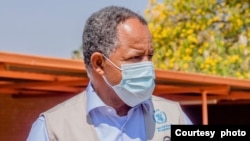A top World Food Program (WFP) official has urged Zimbabwe and surrounding countries to increase food production in light of the Russia-Ukraine war that has caused shortages and a spike in food prices.
WFP Southern Africa Director Menghestab Haile told reporters after meeting with President Emmerson Mnangagwa in Harare Friday that the World Food Program is worried the Russia-Ukraine war has increased food insecurity across southern Africa. The region, he said, should make a concerted effort to grow more of its own food.
“SADC region has water, has land, has clever people, so we are able to produce in this region,” Haile said. “Let’s diversify and let’s produce for ourselves. The governments of the region are working together, the executive secretary of SADC is coordinating the efforts. We are aware there are challenges, but we are aware that through a cocktail of policies and interventions, we will get through this.”
President Mnangagwa did not talk to reporters after meeting Haile.
Zimbabwe was once the breadbasket of the region but in recent years agricultural production has been well below the levels of the last century. The government said it will increase production this year, starting with wheat, so the country can regain its food exporter status.
Just outside Harare, Ephraim Pasipanodya is among the farmers the Zimbabwe government has asked to increase wheat crop hecarage this season. The aim is to have enough wheat by October of this year to achieve self-sufficiency.
“Basically for the last two years, I had 200 hectares of wheat," Pasipanodya said, "and this year I am planning to do about 300 hectares of wheat (because) wheat crop, which is one our major crops and one of our crops which is actually imported.”
Ministry of Agriculture officials are visiting farms, teaching farmers how to increase production and providing seed to farmers. Obert Jiri, chief director in the Ministry of Agriculture, said the government has activated four programs that will target 75,000 hectares of wheat production.
“So we are going on a blitz to train farmers to be able to grow the wheat because we understand that wheat is a technical crop,” Jiri said.
The Zimbabwean government has adopted the theme of “wheat self-sufficiency at all costs,” saying it has a solution to the wheat shortage the world is facing because of the Russia-Ukraine war.
Next, officials will target the country’s staple corn crop come October-November. If the plans work out, that will be good news to organizations like the WFP, which have been feeding hungry Zimbabweans for years.











